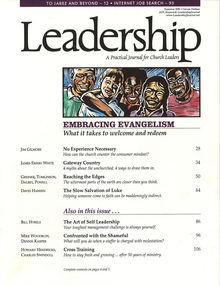“Sorry, Pastor, we have been so busy,” the woman said. “One of the deans is getting a book ready for publication and our energies have been focused on that. We’ll send your resumé out as soon as we can.” I hung up the phone wondering why I had paid the placement fee.
Another service lectured me on how I needed to be patient. It had been three months since they had sent my resumé to a church. “There are a limited number of churches looking for a pastor,” they said.
I shared my frustrations with a fellow pastor. He said, “Try the Internet.”
Using the phrase “church placement,” I found several sites that specialized in placing ministers. I clicked on one of the links. My computer screen was filled with opportunities. It was overwhelming. Several listings caught my eye. Within an hour or so, I had sent my resumé, a family photo, and my philosophy of ministry to 25 churches. Traditional methods and placement services would have taken six months to contact that many churches. The next day, I received responses from three of them. The messages thanked me for my inquiry and assured me that they would keep me posted. Soon I was hooked. I began to check for new listings every day.
Learning to ask the right questions
After the prompt responses from the first few churches, it was easy to forget that there was a committee process on the other end. Often weeks or months passed before I would hear from a church a second time. Most of the time there would be no further contact. One church, in particular, sent a glowing message stating that I matched their profile. They asked if I could email them a specific day and time that I would be available for a phone call. I replied. On that day I waited by the phone, but the call never came. I sent another message to see if there was a problem. I never heard from the church again.Another lesson I learned was to limit my search geographically. Since the Internet listed opportunities from around the world, I sent my resumé everywhere, at first. One church in the western states wanted me to come and preach for them. All their prospects did, the committee said. That was okay with me, until I learned they expected me to pay travel expenses for my family and myself—from Pennsylvania. After another church made the same request, I decided to search closer to home.
My search narrowed as I began to look at opportunities that fit my giftedness and background. I had a particular kind of church in mind. One church caught my eye. After several phone conversations and emails, I was invited to speak there. I knew on arrival this church was not a “fit.” The church was located in a suburban community, one hour from New York City. I felt very much like the country mouse that went to the city.
I also realized that a church’s profile posted on the Internet might not be current or accurate. One church looked good online, but when I visited there, I discovered the programming they highlighted no longer existed, and their attendance had been reduced by half. I learned to ask more specific questions about the church.
At last, a match
During my search I was able to make contact with hundreds of churches via the Internet. Using traditional methods my resumé was sent to fewer than seventy churches. And the Internet provided excitement and hope, keeping the search process fresh.After a year, I heard from a semi-rural church in Pennsylvania. Mine was one of sixty resumés they received by email. After I candidated, they extended an invitation for me to be their pastor. It was the right fit.
George Cannon is now pastor of Curwensville Christian Church in Curwensville, Pennsylvania.
Copyright © 2001 by the author or Christianity Today/Leadership journal. Click here for reprint information on Leadership.









